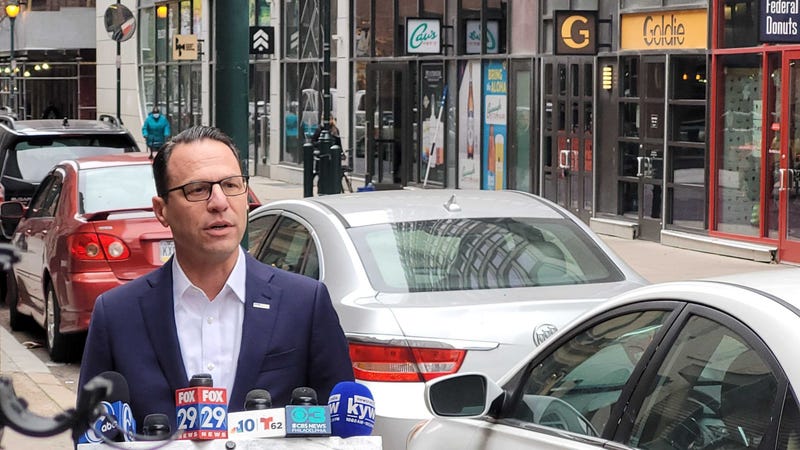
PHILADELPHIA (KYW Newsradio) — Gov. Josh Shapiro was in Center City on Wednesday, paying a visit to a restaurant he says was the target of antisemitism during a recent pro-Palestinian rally.
Shapiro stopped by Goldie in Rittenhouse to show his support for Michael Solomonov, co-owner of the Israeli-style falafel shop, where, on Sunday night, a pro-Palestinian rally marching from Rittenhouse Square to University City stopped to chant, "Goldie, Goldie, you can't hide. We charge you with genocide."
The governor spoke with reporters after his visit.
"This is a moment where the people of Philadelphia should come together and not only support restaurants like this, but need to stand up against hate and bigotry and antisemitism in all forms."
Goldie has been among several city restaurants that have been the targets of boycotts by the Philadelphia Free Palestine Coalition. In the wake of the Oct. 7 Hamas attack, Solomonov announced some restaurant proceeds would be donated to emergency medical relief efforts in Israel.
The chants linking criticism of that support to “genocide” were widely criticized as anti-Semitic by many politicians, including those who have supported the Palestinian movement.
The larger purpose of the rally, according to the coalition’s Facebook’s page, is to "stop the genocide, lift the siege on Gaza, end military aid to Israel," stating also: "A temporary pause is not what we asked for, we demand a complete end to the siege on Gaza and an end to the U.S complicity with Israel."
Shapiro scolds Penn president
Shapiro also reacted to statements by University of Pennsylvania President Liz Magill at Tuesday's congressional hearing on antisemitism on college campuses.
Magill said antisemitism has no place at Penn, reiterating an “unyielding commitment to combating it.”
“As president, I am committed to a safe, secure and supportive educational environment so that our academic mission can thrive,” Magill said in her opening statement.
“As a student of constitutional democracy, I know that we need both safety and free expression for universities and ultimately democracy to thrive. In these times, these competing principles can be difficult to balance, but I am determined to get it right. And we must get this right. The stakes are too high. Penn would not be what it is without its strong Jewish community past, present and future.”
Like Magill, the presidents of Harvard University and MIT, also questioned at Tuesday’s hearing, disavowed antisemitism and hateful conduct on campus, and said generally that hateful speech is protected by their campus policies and the First Amendment unless the speech crosses over into action.
Republican congresswoman Elise Stefanik of New York asked Magill about Penn's code of conduct: "Calling for the genocide of Jews — does that constitute bullying or harassment?"
Magill did not give a direct yes or no response: "If it is directed and severe, pervasive, it is harassment. … It is a context-dependent decision, Congresswoman."
Shapiro did not like that answer.
"That was an unacceptable statement from the president of Penn. In fact, I thought her comments were absolutely shameful. It should not be hard to condemn genocide," the governor said.
"If we are simply talking about their policies at Penn and if that doesn't violate the policies at Penn, well there is something wrong with the policies at Penn, that the board needs to get on or there is a failure in leadership from the president or both."
Magill posted a video to social media later Wednesday night revisiting her testimony from Tuesday.
"In that moment, I was focused on our university's long-standing policies aligned with the U.S. Constitution, which say that speech alone is not punishable. I was not focused on, but I should have been, the irrefutable fact that a call for genocide of Jewish people is a call for some of the most terrible violence human beings can perpetrate. It's evil, plain and simple," she said.
"For decades, under multiple Penn presidents and consistent with most universities, Penn's policies have been guided by the Constitution and the law. In today's world, where we are seeing signs of hate proliferating across our campus ... in a way not seen in years, these policies need to be clarified and evaluated."
Magill goes on to say that she and Provost John Jackson will immediately convene a process to do so.
Pro-Palestinian rallies on college campuses in the past few months have featured chants that have been extremely divisive, including "From the river to the sea, Palestine must be free" and "There is only one solution: Intifada revolution." Many Jewish people and supporters of Israel see these slogans as coded language calling for violence against Jews, while Palestinian supporters say they are empowering calls for self-determination and freedom from oppression.
Shapiro says Penn's board of directors now has a serious decision to make, asking: Does its president's testimony represent the values of the University of Pennsylvania and the views of the board? Shapiro says, once that happens, he'll decide what he will do next.
On Oct. 7, the terrorist organization Hamas attacked Israel, killing about 1,200 people, mostly civilians, and took hostage about 240 people, more than 100 of whom were returned to Israel during a temporary pause in fighting last week. In response to Oct. 7, Israel has killed more than 16,200 Palestinian people in Gaza — the majority of them women and children — and wounded more than 42,000, with continual bombardment and ground assaults, according to the territory’s Health Ministry.
The U.N. says some 1.87 million people — over 80% of the population of 2.3 million — have already fled their homes in the north to take refuge in the south, where the Israeli military is now focusing its efforts, further shrinking the area where Palestinian civilians can seek safety and pushing masses of people toward the sealed-off border with Egypt.
The Associated Press contributed to this report.
